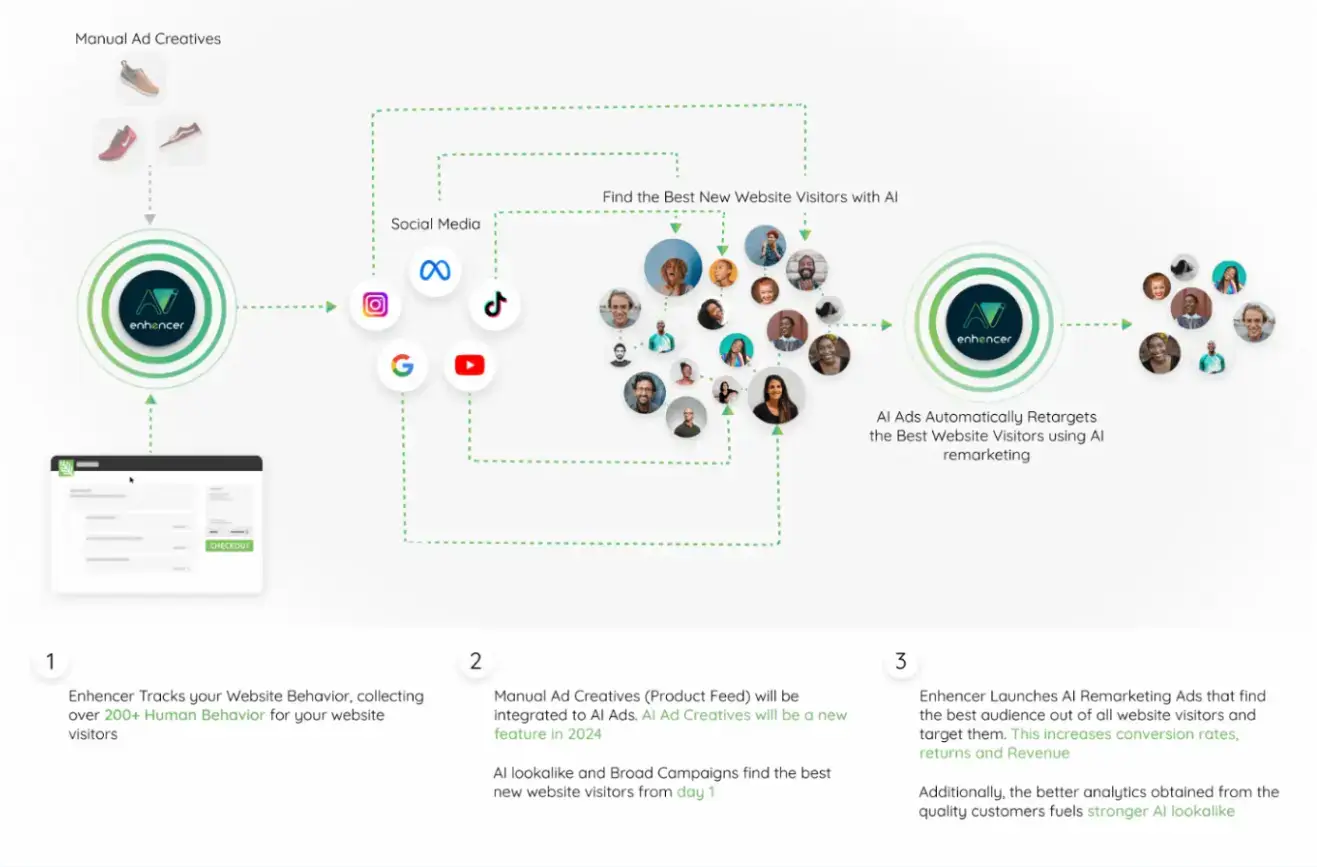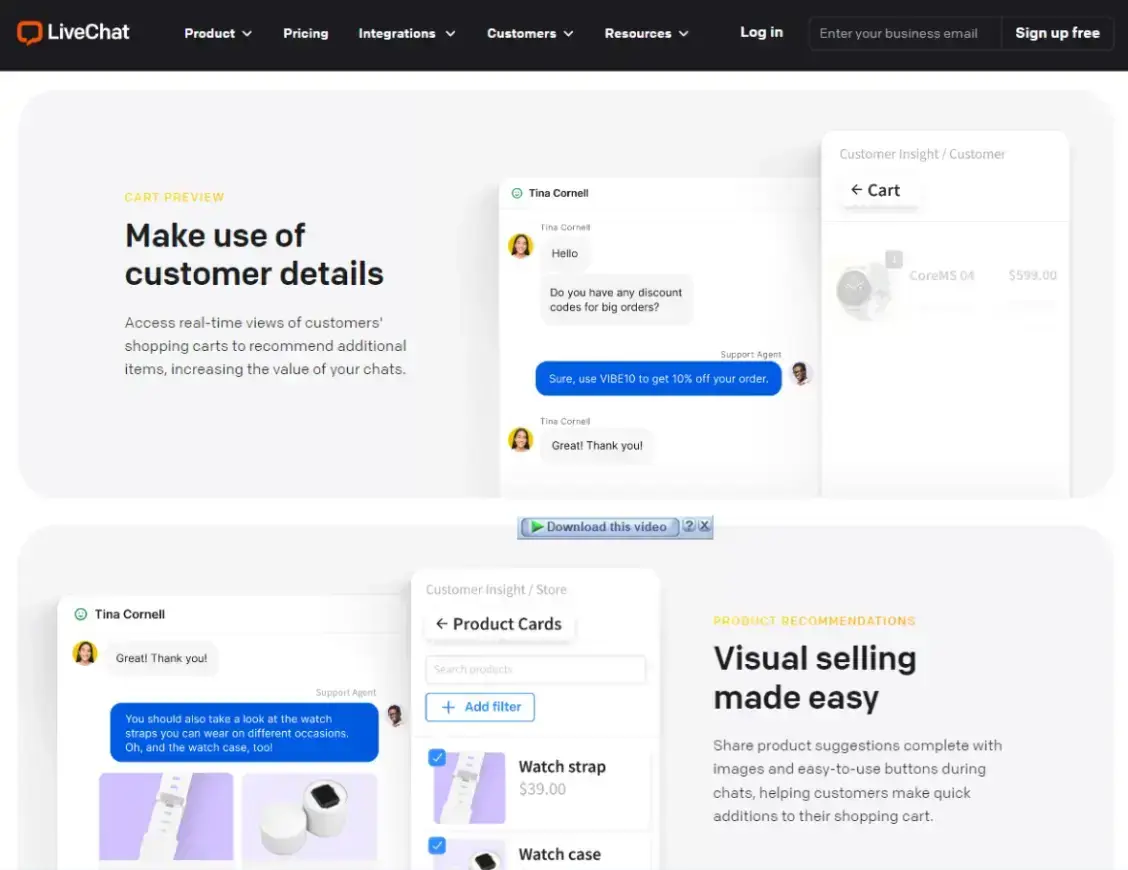AI is present in almost all industries today, including e-commerce, where its significance extends beyond being a passing trend. Its applications span from improving product searches to customizing personal recommendations and automating customer support.
Here's where we step in. In this guide, we'll describe AI's role and impact in e-commerce and walk you through how to implement AI in e-commerce, along with relevant AI tools for the job. This will empower you to utilize AI effectively and translate technological innovation into tangible business success. Let’s begin.
Article Shortcuts:
The Role of AI in E-commerce and Its Impact
Before exploring how AI influences e-commerce, let’s first understand the technology that drives it—generative AI development services and machine learning.
Generative AI includes systems that can produce various types of content, such as images, texts, music or video based on user inputs, which are often known as “prompts.”
In e-commerce, this technology is utilized to generate product descriptions, product images, videos and advertisements. It can also be used to manage customer inquiries through chatbots that generate automatic replies based on their queries.
The other side, machine learning, is all about systems learning from data they gather to spot patterns and make decisions independently.
For e-commerce, it helps suggest products to customers based on their previous purchases and even predicts what might be trendy, making it easier to keep stock levels just right.
You can see how machine learning and generative AI could help make e-commerce operations more efficient and powerful. Implementing AI development services ensures these technologies are customized to fit unique business needs.
Machine learning, a part of AI, analyzes large amounts of data to help identify shopping trends and predict high-demand periods. Generative AI personalizes customer interactions, improving the online shopping experience.
Working with a Shopify development agency ensures that these AI-driven solutions are implemented effectively, helping your e-commerce store stay ahead in performance and customer experience.
E-commerce businesses also use chatbots, NLP, and data analytics to enhance operations. These AI tools automate customer support, understand customer preferences, and simplify tasks, saving time and resources.
Overall, AI in e-commerce isn't just about convenience. It's about using advanced tech to understand and meet customer needs, making shopping smoother and business operations more efficient.
Now, let’s see how you can put e-commerce AI tools in action to scale your business.
5 Strategies to Scale Online Business With E-commerce AI Tools
AI, unarguably has significant benefits to it when used the right way. Here, we have described the five effective strategies to use e-commerce AI tools.
1. Update, refine, and optimize your product descriptions
Writing product descriptions that grab attention and convince visitors to buy is key to e-commerce success.
But it is a highly time-consuming effort. Not only that, you need to regularly check the competition and see if your product description warrants an update.
And if you are the one who writes product descriptions by yourself, it could eat up a lot of your bandwidth.
Here, you can use AI product description tools such as Hypotenuse.ai or Describely.ai to help you create or refresh product descriptions in a matter of seconds.
All you need to do is feed in your product's title, mention your brand guidelines or tonality, describe its features, and voila! The AI tool generates descriptions with a single click.

You can further optimize these product descriptions for SEO purposes, too.
2. Use intelligent retargeting
Traditional marketing segmentation, which remarketing relies on, has its challenges. It's hard to match the right person with the right product, especially after they log out.
Sorting through data on various interests and groups to find real needs is also tricky. Campaigns often need lots of trial and error to determine what works, which takes time and money.
That's where AI comes in. It makes user segmentation easier by using machine learning to analyze data on users' past purchases and spot patterns that predict their future buying habits.
AI helps you provide personalized product suggestions, boosting opportunities for upselling and cross-selling. Predictive marketing and remarketing benefit greatly from AI, making it simpler to reach out to customers who have shown interest in particular products or services, nudging them towards completing their purchase.
AI tools like Enhencer’s AI remarketing help track users' website behavior by retargeting pixels, collecting relevant data points, selecting the ads, and intelligently retargeting them to the best audience of all website visitors. The data received from this remarketing campaign enhances lookalike audiences for better prospecting.

Source: Enhencer
3. Create high performing impactful ads
You need to invest a lot of time, money, and energy to create just one impactful ad. And if you are a solopreneur, or have a small team, doing this on scale seems almost impossible.
Thanks to developments in AI, we now have powerful AI ad generators that create stunning graphics and videos for use in running ads on social media.
For example, Adcreative.ai is a dedicated AI tool that instantly generates ad creatives.
You need to upload your product’s photo, remove the background if needed, and add the desired effects or elements, and it automatically generates creatives in different sizes for different ad formats.

Source: Adcreative.ai
Here’s a sample of an Instagram story with product photos digitally manipulated using AI.

Source: Segmind
4. Provide augmented 24x7 customer support with AI chatbots
Many e-commerce retailers are advancing their AI capabilities, with 'conversational commerce' becoming a popular approach. And that is achieved through chatbots.
AI Chatbots can automate order processes and provide effective, low-cost customer service.
Consumers browsing online are often logged into social platforms like Facebook or Instagram. This creates a great opportunity to use messenger functions to confirm orders or offer instant support.
You can also integrate chatbots into your shopping cart system. AI Chatbots need shopping cart integration to access product details, quantities, and shipping terms, allowing them to give accurate answers to customers.
Once a chatbot is integrated with one shopping cart, it can work with all stores on that platform. The more shopping carts your chatbot supports, the more customers you can reach.
Livechat offers Chatbot that can integrate with e-commerce platforms such as Shopify and Bigcommerce.

Source: LiveChat
Chatbots offer valuable customer support for e-commerce retailers.
While contact forms, phone calls, and email are good options, online chat remains the fastest and most convenient way for visitors to get answers.
5. Make your business process more efficient
AI e-commerce tools can help streamline business operations, increasing efficiency and cutting costs.
AI optimizes delivery routes and manages inventory for warehouse and logistics management, reducing waste and saving time.
AI also helps to maintain optimum working capital by integrating with accounting software to generate detailed inventory reports and gain insights into stock levels, turnover rates, and sales trends.
Many AI systems, like Siri and Alexa, support natural language learning and voice input. This enables a CRM system to respond to customer queries, resolve issues, and identify new sales opportunities.
Some AI-driven CRM systems can multitask to manage all these functions and more.
The North Face, a major e-commerce retailer, uses AI to better understand their customers. They use IBM's AI solution — Watson, to help online shoppers find their ideal jacket.
By using voice input to ask customers questions like "when and where will you use this jacket?", IBM's software scans multiple products to find the best matches based on real-time input and factors like local weather conditions.
Conclusion
AI is becoming increasingly influential in the e-commerce sector, and this trend is set to continue. AI is expected to keep enhancing personalized shopping experiences.
More businesses will likely use AI to identify and address customer issues quickly and accurately. Natural language processing can help detect dissatisfied customers, urgent issues, or specific product complaints from large volumes of customer interactions.
As AI evolves, you can prepare your e-commerce business by learning how to integrate AI while maintaining the personal human touch central to your customer relationships.
Author Bio
Taher Batterywala is a creative marketer who loves to write & design content that organically drives conversions. He is the creator of Pineable, the world's first content marketing design inspiration hub. He regularly shares his thoughts about content marketing, SEO, and design. As a true cinephile, he admires movies above anything else.



